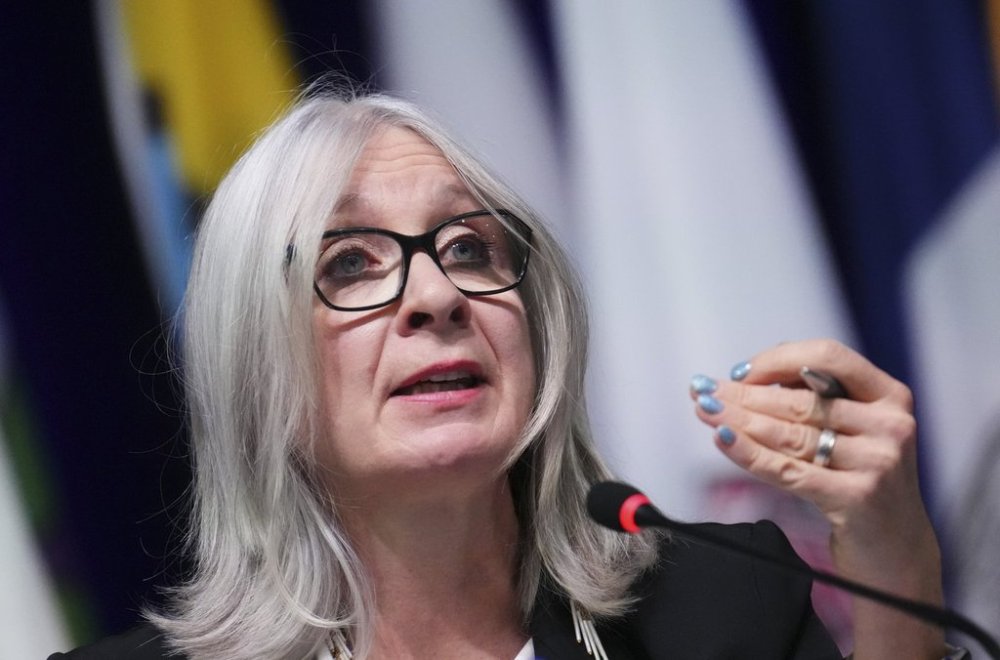Canada says it will fund Jordan’s Principle for First Nations kids through 2026
Advertisement
Read this article for free:
or
Already have an account? Log in here »
To continue reading, please subscribe:
Monthly Digital Subscription
$0 for the first 4 weeks*
- Enjoy unlimited reading on winnipegfreepress.com
- Read the E-Edition, our digital replica newspaper
- Access News Break, our award-winning app
- Play interactive puzzles
*No charge for 4 weeks then price increases to the regular rate of $19.00 plus GST every four weeks. Offer available to new and qualified returning subscribers only. Cancel any time.
Monthly Digital Subscription
$4.75/week*
- Enjoy unlimited reading on winnipegfreepress.com
- Read the E-Edition, our digital replica newspaper
- Access News Break, our award-winning app
- Play interactive puzzles
*Billed as $19 plus GST every four weeks. Cancel any time.
To continue reading, please subscribe:
Add Free Press access to your Brandon Sun subscription for only an additional
$1 for the first 4 weeks*
*Your next subscription payment will increase by $1.00 and you will be charged $16.99 plus GST for four weeks. After four weeks, your payment will increase to $23.99 plus GST every four weeks.
Read unlimited articles for free today:
or
Already have an account? Log in here »
Hey there, time traveller!
This article was published 22/03/2025 (261 days ago), so information in it may no longer be current.
MONTREAL – Ottawa says it will continue to fund Jordan’s Principle to support First Nations children through 2026 as some First Nations chiefs decry what they call cutbacks in services.
Indigenous Services Minister Patty Hajdu announced the extension in a press release Saturday, about 24 hours before a federal election campaign is expected to kick off. The principle is intended to assure that Indigenous children can access government-funded health, social or educational services regardless of where they live and without seeing their cases bogged down in jurisdictional disputes.
No specific spending amounts were provided in the latest announcement, but Hajdu said the government has poured $8.8 billion into the principle since it was established in 2016.

Indigenous Services Minister Patty Hajdu takes part in a panel during the Assembly of First Nations Special Chiefs Assembly in Ottawa on Dec. 5, 2024. THE CANADIAN PRESS/Sean Kilpatrick
“More than 8.9 million products, services, and supports have been approved since 2016 under Jordan’s Principle,” Hajdu said.
The principle is named after Jordan River Anderson, a Manitoba boy with multiple disabilities who died in hospital waiting for the province and Ottawa to decide who should pay for health supports that would allow him to go home. It stems from a human rights complaint filed by the Assembly of First Nations and the First Nations Family and Caring Society in 2007.
Hajdu also said she has asked Indigenous Services Canada to review the contribution agreements of First Nations recipients to make sure expenses incurred under the principle in 2024-2025 will be considered for funding.
“This review is intended to support partners who are providing critical services to First Nations children through the transition to the new operating procedures related to processing requests under Jordan’s Principle,” she said.
Last month Canada announced it would bar funding approvals for home renovations, sporting events, international travel, and non-medical supports or school-related requests unless required to ensure equality with kids who are not First Nations. Those changes came after the federal government argued before the Canadian Human Rights Tribunal that requests were being made for a swath of non-urgent matters. Canada argued that the scope of Jordan’s Principle had become too broad and contributed to a backlog of requests.
Cindy Blackstock, head of First Nations Family and Caring Society, was not immediately available for comment Saturday. However, she has accused the government of shirking legal obligations and failing to provide evidence of misuse or how widespread the alleged problem is.
Blackstock has also argued that the government takes too long to process requests, leaving children without access to services, and said the backlog issue is a problem of the government’s own making.
Blackstock launched a non-compliance motion against Canada early last year, and the Tribunal ruled in December Canada needs to address the backlog of requests along with creating an independent complaints mechanism.
Last week, the Assembly of Manitoba Chiefs accused the government of failing to live up to its duties by denying requests and cutting back on funds. The chiefs accused the Trudeau government of neglect and called on newly sworn in Prime Minister Mark Carney to rectify what the called a broken system.
This report by The Canadian Press was first published March 22, 2025.

